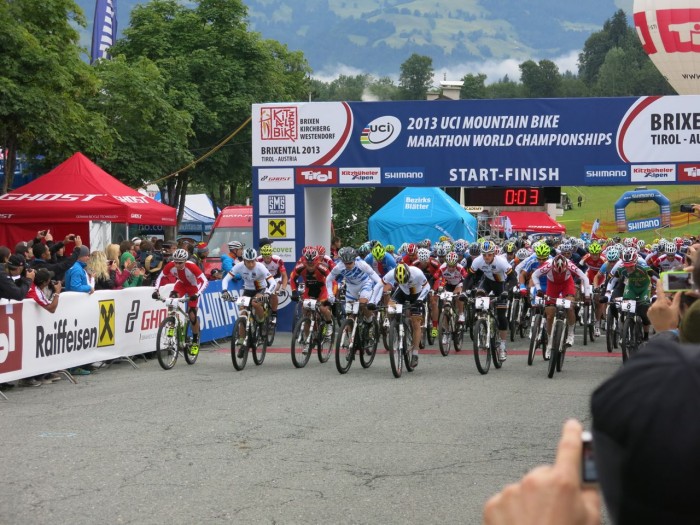World Championship events are the pinnacle of any sport. With a young sport like mountain biking that continues to diverge and grow, we now have five separate UCI sanctioned disciplines that contest a World Title. It may be confusing to outsiders, but it shows the variety in the sport, and the range of talented athletes that are attracted to mountain biking.
On 29 June in 2013, the UCI Marathon Mountain Bike (XCM) World Championships took place in Kirchberg, Austria. The first XCM Championship took place in Lugano in 2003, and the race has not yet left Europe – but will this year, when Pietermaritzberg, South Africa, hosts the XCM World Championships on 29 June.
Marathon racing has a certain allure to it, which is probably why you are reading this post. Few people can recount a Marathon MTB race where they have finished fresh, comfortable and incident free. Big point to point races, or big loops, have a sense of adventure and self sufficiency that is at the core of mountain biking for many riders. It is a race, but it is also a personal challenge. This is why the numbers of entrants at Marathon MTB races far outstrips those at Olympic XC, XC Eliminator, Downhill and Observed Trials.
At the XCM Champs in Austria, although the start lists were stripped back to only those nominated by their National Federation, the races were filled by both amateur athletes and professional riders. There were 141 men and 66 women who made sacrifices to be there on the day, to represent their country.
What would you sacrifice for this feeling?
Those sacrifices change depending on the rider, and their given circumstances. I spoke to a selection of riders in Kirchberg before the race, about how they got there, and what drove them there.
Bios:
Erik Kleinhans
Nationality: South African
Job: Pro Rider
Age: 31
Team: RE:CM
Result: 38th
Ben Thomas:
Nationality: British
Job: Team manager/Shop Staff
Age: 25
Team: MountainTrax-Vauxhall
Result: 51st
Sally Bigham:
Nationality: British
Job: Pro Rider
Age: 36
Team: Topeak-Ergon
Result: 2nd
Rachel Fenton
Nationality: British
Job: Accountant
Age: 31
Team: Canyon UK
Result: 50th
With our sport being so young, the development pathways are not as obvious as in road cycling. MTBers enter the sport in different ways.
“It wasn’t very difficult to fall in love with Marathon and stage racing.” Says Erik Kleinhans, who has won three ABSA Cape Epic races in the Mixed category with his wife Ariane. “I was the South African XCO Champion in 2009, but mostly did the shorter more technical version of the sport to sharpen up my skills for the marathon races which I felt suited my capabilities and personality more.”
Erik Kleinhans is no stranger to the world stage.
The attraction of doing big rides draws many to Marathon, like British rider Ben Thomas “Why rotate around a 5km loop when you can race a 95km single lap race through the mountains with fantastic scenery?” Having made a move from XC, Thomas points out “I still really enjoy the pure flat out nature of a good National XC race but marathon racing is my preferred distance”.
Sally Bigham and Rachel Fenton both seem to have just fallen into it, “I always thought i didn’t like long distance rides, but my boyfriend has always liked marathons so in 2012 i went to a World Series race with him and wasn’t last!” In fact, Fenton finished well enough to qualify for the Marathon World Championships. Bigham was a little different, without a set mountain bike background “I borrowed Dave’s (partner) MTB and rode as far as I could and when I returned home Dave quizzed me as to why I’d ridden so far!”
Sally Bigham (Topeak-Ergon) was victorious at the 19th Dolomiti Superbike. Photo: www.wisthaler.com
Despite these different starts, all four of these athletes were in Kirchberg, Austria, for the 2013 UCI Mountain Bike Marathon World Championships, and two will be racing in Pietermaritzberg. Whether it was a personal or sporting goal needs to be married to the desires of sponsors as well – but a World Championship does have a powerful allure on all riders.
“It’s always great and an honour to wear your national kit and it plays a big part in making the event special” says Kleinhans, but adds “The South African summer season is my main sporting goal for 2013. Having South African sponsors the European summer season is pushed into secondary goals, and with five months of hard racing behind us already it is tough to stay in the best shape for Worlds at the end of June”.
Erik Kleinhans, modelling some kit adapted to Euro conditions
Sally Bigham agrees in that representing her country is a huge honour, but “the World Champs are more about achieving my own personal goals and those of my trade team Topeak Ergon Racing Team who have supported me throughout my 5 year long development as a rider.” But in a sporting sense, the racer inside Bigham feels “all others pale into insignificance relative to this one. Nothing equals the Worlds where all of the best athletes come together and compete for the rainbow jersey and medals.”
Bigham, celebrating silver with her partner.
Thomas confirms that although the Worlds are a pinnacle of the sport, it hasn’t been his main goal for the year, “Wearing your national colours is a huge privilege, representing GB and putting on a good showing at Worlds is a key priority but not at the top of the list of goals. My biggest goal for the year was to win National Marathon Champs but this didn’t work out.”
Patriotism draws Fenton to the Worlds too, but her goals are matched to her work/life/sporting balance. “It was a dream to represent GB but I didn’t think it was really possible. When I got a top 20 in one of the Marathon Series races in France I realised I had the opportunity. For me representing my country and getting to be in the same team as riders such as Sally Bigham and Jane Nuessli is a really big deal.
For Fenton, it was a holiday as much as a race.
Preparing for bike races requires the time and investment on the bike before hand, including the immediate time before the event.
“We travelled to the Worlds venue on the Monday before and could fit in two days of decent course inspection, it’s nice to experience the climbs and be able to smash the technical riding on race day.” says Kleinhans.
“I arrived in Austria for 4 days early and spent the time riding sections of the track and resting. It’s always good to arrive to a big event with plenty of time for final preparations” adds Thomas. Fellow Brit Fenton had to make sure the race fitted within the constraints of work and other commitments “Coming to race the Worlds is a holiday for me and my boyfriend so to make it all worthwhile we have combined it with racing the Dolomiti Superbike the weekend after and spending time in Livigno between. I would love to have ridden most of the course before and certainly would like more time getting used to longer climbs.”
Ben Thomas warms up before the race start. Photo: John@Vermont Images
Being able to devote the time to understand the course is key, and each athlete recognised this. It was only Bigham who was able to invest in this the most from these four athletes. “Having raced on the course the last 2 years I felt I knew it pretty well, but it was important to re-familiarise myself with it so we arrived 2 weeks before the race. Testing different equipment (e.g. tyres, air pressures, gearing etc.) was also important so arriving early allowed me to spent time trying different things.”
That ability to devote time comes hand in hand with appropriate team support. For a race that traverses multiple peaks in steep valleys, team support on course was important for spares, and for nutrition.
What’s a trip to Europe if it’s not a holiday?
“I think ideally here you need 2 members of support staff, the feed zones are quite difficult to access” As Thomas had one person supporting him, they analysed the route to have support when it would be most useful. Fenton runs on her pocket contents though “I will be entirely self sufficient for the race. My boyfriend also races and will be doing the support race and I would not want him to sacrifice this for me to have support out on the course.” And if you compare this again to Sally Bigham, another Briton who had “2 mechanics, a physio, our team manager and 3 other supporters. This was important because many of the tech zones had to be reached by cable car and bike! Each feedzone was equipped with spares parts such as chains, wheels etc.” and it is obvious how much a race like the Worlds comes down to personal and professional interest as much as the support of your National body.
Planning, preparing and support – they are all key when aiming to qualify at a World Championship event, and then race it to the best of your ability. But there has to be something deeper that drives racers to train, sacrifice and suffer for so much of the year. Self improvement and the sporting experience drives both the amateurs and professionals.
“My goal the last couple of years has been to get a medal at Worlds. Now I’ve achieved a silver medal the only way to better that is to win!” Exclaimed Bigham.
The women’s podium at the 2013 XCM Worlds – there is only one step higher to climb for Bigham!
Erik Kleinhans raced XCM Worlds in 2011 as well, and figures that as long as he is racing competitively he will chase a Worlds slot, “being a Marathon racer, it goes without saying that I want to partake in the biggest marathon race in the world. The 2014 edition will take place in my home country… but to take it seriously a slight adjustment in our early season racing calendar will be needed.”
Sporting goals still need to be justified, and as much as Rachel Fenton wants to compete again, costs can get too high. “I’ll probably sit out next year because the race is in South Africa and I can’t afford to get out there. After that we will have to see.”

